- Home
- Fay Weldon
Before the War Page 3
Before the War Read online
Page 3
Why? Why?
Vivvie unfolds her gawky self into a chair and Sherwyn perches on the corner of his desk. He finds the fashions of the day unappealing at the best of times – beanpole women with low waists and flattened chests, droopy attitudes, long beads, longer scarves: only the very good-looking can get away with it. But most at least make some sort of effort to please men. Vivien Ripple doesn’t. She takes off her hat and shakes out her hair, and that at least is quite pretty. She has not had it bobbed and it ripples down her back in a reddish brown stream.
‘Ripple by name and ripple by nature,’ he says, courteously. ‘Charming.’
‘I’m thinking of getting it bobbed,’ she says. ‘People always admire my hair when they have to think of something complimentary to say. Better if they didn’t say anything.’
He could see that on closer acquaintance she might be quite entertaining. She did say the unexpected and at least seemed to have a functioning brain, which was more than you could say for most of his female acquaintances. One never could tell, of course. So many girls were taught not to display intelligence in case it put men off, any female idiocy might well be mere affectation. The prettiest face might hide the wittiest brain.
Miss Ripple falls quiet again. She is more serviceable than pretty, he thinks. Her jaw juts as does her father’s, but what proclaims a man as a master of lesser men makes a girl look sulky and stubborn, as though something went wrong at her birth. Well, her mother Adela’s hips being narrow – perhaps there had been some breeding difficulty?
‘Well?’ Sherwyn tries to hurry Miss Ripple on and out. She seems reluctant to speak at all. His own position of rest – and he is aware of the paradox – is one of overwhelming impatience, a constant preparedness, alert for the next blow from the unexpected: words burst out of him all too easily. He stops his legs swinging. Miss Ripple might get a glimpse of the soles and despise him. But the state of his shoes is hardly his fault, but that of her father, of Sir Jeremy the hypocritical skinflint: why should Sherwyn care what the daughter thinks of him? She for her part is dressed very oddly. There are actually moth holes in her scarf. Perhaps the father is as mean to his daughter as he is to his staff, which is why she dresses as she does? He feels a flicker of fellow feeling for her – they are both victims.
‘I’ve had to “screw my courage up to sticking place” for this,’ she says. ‘I’d be glad of a little mercy.’
‘You and Lady Macbeth?’ he says. ‘If you want me to murder Duncan you may have come to the wrong person.’
‘You are not Duncan. Though you are to all accounts a virtuous and well-liked man.’ Well, thinks Sherwyn, at least she knows her Shakespeare. Then she says:
‘I am here to ask you to marry me.’
Just like that. Straight out. No preamble. Oh dear. Mad.
How very awkward. What is a man to do?
June 21st 1947. The Albany, Piccadilly
The Unwelcome Package
Sherwyn was to confide what happened next to Mungo, his colleague in the attic office next door. Mungo was also an aspiring writer – it was Sir Jeremy’s policy to get young men of budding talent onto his staff, especially if they were good-looking – and twenty-five years on, in 1947, Mungo will include an approximation of the proposal scene in his own first and only novel Vice Rewarded. He will by that time be managing director of Bolt & Crest, his own advertising agency. A proof copy of Vice Rewarded will arrive unexpectedly at Sherwyn’s bachelor apartment in the Albany, Mayfair – Sherwyn’s between wives at the time, after finally divorcing Marjorie McShannon the Hollywood film actress. The maid has brought in breakfast from Fortnum & Mason down the road, but rationing is tight and she’s only managed Camp coffee concentrate and scrambled eggs made from powdered egg and milk on dry toast with no butter. She’s also brought in a package. It feels like trouble. Sherwyn had spent much of the war in Paris as an undercover SOE agent and that kind of thing makes a man wary, paranoid, even.
Sherwyn opens the package – only a book, with a covering letter from Samuel Epstone himself. He reads. Perhaps, Epstone asks, Sherwyn could provide a note of recommendation to go on the jacket of a new novel he was publishing, since Mungo, he gathered, was a friend of Sherwyn’s back in the earlier days of Ripple & Co? In Mungo’s Vice Rewarded, it seemed, Epstone saw another book as important as something like Camus’ L’Étranger. Mungo Bolt, hiding his light under a bushel for so many years, is now revealed as an existentialist philosopher posing as an ad man: delving in this most thoughtful novel into the underlying nature of humanity: ‘We can all recognise ourselves in these profound lines.’
What utter balls, thinks Sherwyn. Mungo has never had a profound thought in his life, all he’s ever been fit for is advertising slogans like ‘Buttoning’s Such a Bother’ – and putting his prick where it doesn’t belong. Not much of a prick, either, pretty pathetic: Sherwyn used to behold it in the showers when he was at the front, when was that, back in ’16? Half the length and half the width of Sherwyn’s own.
The clue of course was in the phrase ‘we can all recognise ourselves blah, blah, blah’. It was a coded message. Epstone was warning him that Vice Rewarded was a roman à clef. He, Sherwyn, was in the book, might take offence, might possibly sue. He was being sounded out.
Sherwyn puts aside his disgusting breakfast – he will lunch at Rules, where at least you can get a good rabbit fricassee – and opens his former friend’s, now enemy’s, novel. It has a plain cream textured jacket in the French style, the paper is thick and the pages uncut: all the marks of a pretentious literary novel, one on which publishers were prepared to spend money.
Presumably Mungo had contributed to the cost. What was he playing at? Did he really have literary aspirations? He must know by now he was an awful writer. He had written one novel while working at Ripple’s with Sherwyn, but no-one was prepared to publish it. While Sherwyn’s career as a writer had blossomed, Mungo had cast himself on the wilder shores of advertising, where he flourished: ‘For Added Strength and Security Say Yes to Crest Zips!’ or, more generically, ‘Down with the Button, Up with the Zip’ was Mungo’s level.
True, there had been that trouble over the twins, and Sherwyn had seduced Mungo’s dull and skinny ex-wife to be revenged, ‘but that was in another country, and besides...’ Mungo had never really liked her. But it probably hadn’t helped. Mungo was the kind who nursed grudges. No-one keeps their mouth shut for ever, as Sherwyn had learned to his cost. Truth always emerged in the bitter throes of anger or divorce.
Something was up and it did not bode well.
Sherwyn let the book fall open where it would, to the pages where perhaps others had read before. And as he half expected, there he was for all to see and giggle over crucified upon the page, referred to as ‘The Dwarf’ along with poor Vivvie ‘The Giantess’, in a cruel account of that memorable proposal scene as long ago related to Mungo by Sherwyn himself. How misplaced that trust had been! Sherwyn read in horror. It was not done kindly: it was intended to humiliate and hurt. The Dwarf? Not only had a friendship been viciously betrayed but his wife’s memory had been insulted and besmirched. True, it had been the briefest of marriages, shattered by her untimely death, but a wife is a wife.
Sherwyn had kept the proposal scene out of his own work (planning to preserve it for the great literary novel he looked forward to writing one day, when the popular Delgano seam finally gave out). It had been a memorable occasion, certainly. But it was so long ago! Had Mungo, the thieving, plagiarising swine, actually taken notes at the time? It was possible, even probable, and it seemed to Sherwyn as he read on, certainly so.
The Past Is Never Over
Vivvie’s twin daughters, Mallory (the plain one) and Stella (the pretty one), were to pore over the passage when the same morning post delivered Vice Rewarded to No 17 Belgrave Square. It came out of the blue and had in fact been sent in error; a typist’s slip as she sent off review copies to everyone on Samuel Epstone’s list, either not noticing, or misch
ievously ignoring, the instruction ‘not for Ripple family’. But the girls were not to know this and fell upon the novel with delight. Not only had the book been written by Mungo Bolt, the mysterious but jovial man who had called by their nursery when they were small, bearing gifts (rocking horses, dolls’ houses, train sets – Mallory would engineer the most magnificent collisions), but it contained their only description of the woman they now knew to be their mother. Everyone seemed all too happy to forget Vivien – especially Adela. Any detailed description of her, ‘Giantess’ or not, was precious. At least it was confirmation that the Dwarf was indeed their father. In their young years they’d rather thought it must be Mungo who’d always brought such good presents over the years, better than Sherwyn’s: exciting dolls’ houses not boring rugs, glittery diamonds not tasteful pearls.
The Dwarf prided himself on maintaining an air of amused insouciance through all adversity, and when the Giantess made her outrageous proposal of marriage he did what he could to keep his face straight and preserve an air of equanimity. The Giantess was obviously unhinged or ill, or perhaps the victim of some sexual obsession that Freud would have something interesting to say about. The obvious thing to do was humour her. There might even be a way of turning this unexpected and uncomfortable situation to his advantage.
But unexpected events could all too easily lead to disaster. The Dwarf had already had his fill of them. His sister had been the victim of an incestuous assault by their uncle, his parents divorcing as a result; the arrival of a stepmother with a face like a horse had put an end to his hopes of inheritance. His dwarfish mind raced through alarming possibilities. Perhaps this was a Potiphar’s wife scenario? If he rejected the boss’s daughter she might cry rape and have him carried off to prison. Such things happened. Whatever her motives the utmost prudence was required. This over-tall, over-forward, singularly unattractive young person was in a position of power. Her story would be believed.
Yet she spoke composedly. She did not seem insane. Had something happened a fellow might have forgotten? He had got drunk at the last office party but surely not to the extent of losing his memory. The Giantess was not the kind one would casually flirt with. One would have to go on tiptoe to as much as kiss her. Office life had its temptations and its scandals – and a chap had had his fair share of amiable and passing office encounters – but nothing that could add up to an expectation of marriage.
Yet when the Giantess assured the Dwarf that she was making a business proposition rather than a declaration of love, and that she was without erotic intent, the Dwarf had felt vaguely disappointed. A man likes to be pursued. Though he had his pride and was hardly going to stand at the altar with someone who towered above him; that would be too ludicrous. But what was this about a business proposition?
‘I am not a monster,’ the Giantess was assuring him, ‘though I think you see me as such; I am tall, but would not be out of the ordinary had I been born a boy.’
The Dwarf refrained from saying the problem was that she had not been. Priding himself as ever on his ability to charm he merely said, ‘I am of course deeply flattered. But why me?’
‘Because it is in your interests to agree. You are a writer. All writers need rich wives, at any rate my father tells me this is the case. He is a publisher. He should know. My wealth comes from my mother’s side – on my 20th birthday I came into a not inconsiderable fortune: I inherited a small but prosperous mountain town in Bavaria.’ He did not disbelieve her: it sounded so absurd it was probably true. ‘I will pay off your debts: you are a gambler and a womaniser: I imagine you are on the verge of bankruptcy. You can scarcely afford the shoes on your own feet. The soles are on the verge of flapping loose. Marry me, and you will dress like a dandy and dine like a king for the rest of your life. You will have all the time in the world to write. My father will publish your books, and as his son-in-law do his best to make you rich and famous. It is within his power. For my part I undertake not to stand between you and your pleasures. I am paying you to marry me not to sleep with me.’
The Dwarf began to view her proposition in a more favourable light.
‘Prince Charming will never come along of his own accord,’ said the Giantess. ‘I realise he will have to be bought, and for me the sooner the better. I do not mean to live as a spinster lives, pitied by all. A married woman can be as tall, plain and ugly as she likes if she has the ring on her finger and had been chosen by a man – any man, be he oaf, cretin or criminal, he is still a man – and a man outclasses all women, no matter how pretty, witty or wise she is. And I am none of these.’
If only for decency’s sake The Dwarf felt obliged to point out that she had other choices: these days she could live on her own as an independent woman, in whatever manner she wanted: he knew artists and architects who did that and even earned money enough to support themselves. He found himself relieved when she replied: ‘But still she will be pitied and reviled for not following the life God decreed for women – to be subservient, serve men and propagate the race.’
The Dwarf, at bottom a man of infinite vanity and greed, weakened. The Giantess raised her black fringed eyes to his and they were suddenly beautiful, as was her voice, steady and soft now it had lost the slight whiny overtone of the peevish child and sang the siren song of wealth unlimited. He weakened more. He could see that a following wind of money might blow him to pleasant places. His talent could flourish in a world in which he was free of debt. He could write what he wanted, publish where he chose. And yet, and yet – marriage! Any form of commitment was dangerous. True, she offered him liberty to pursue his erotic inclinations, but once married she might change her mind, and turn into a shrew and a nag. If he waited just a little until he was famous in his own right he could have any woman he chose to fill his bed, and a (preferably titled) wife of his own choice, one of whom other men were jealous. Who would ever envy a short man who put up with a plain giantess for a wife?
But there was always divorce. A man could be so unkind to an unwanted wife she would be happy enough to put him away. The Dwarf weighed up the choices.
‘Thank you for asking,’ said The Dwarf. ‘I would be happy to marry you.’
Storm And Stress
Sherwyn rang his lawyer, Bernie of Courtney and Baum, and said he meant to sue. Bernie advised against it. Hard to prove that being called a dwarf would make a reasonable person think any less of the person so described, though to be accused of having a dwarfish mind might possibly be defamatory? But what did a dwarfish mind consist of? The law was currently busy bringing to book men accused of hideous war crimes; Sherwyn would find little sympathy in the courts for so trivial a complaint. In five years’ time, perhaps – now, no. More, Sherwyn would do himself no favours by objecting to a suggestion that he had married for money: the nearer a libel is to the truth the greater the damages. Sherwyn would do better not to draw attention to himself. As for the Giantess, it was impossible to libel someone after they were dead. Sherwyn broke off the call.
He would have then rung Jeremy Ripple, always good in a crisis and ever anxious to sue, but Sir Jeremy was dead and gone and no longer there for sympathy and advice. He had died a hero’s death in May 1941, when bombs had hit the Law Courts, a fire had started in No 3 Fleet Street, and he’d rashly run back into the building in an attempt to rescue a whole first edition, piled up in the hallway and just in from the printers, of G.D.H. Cole’s A Chance for Everyone. The Times obituary had run to a full half page, which in a time of war and a grave shortage of newsprint, was quite remarkable. Sir Jeremy had been well thought of. ‘A man of conscience, brave in the defence of the freedom of the fourth estate.’ Britain was fighting alongside the Soviet Union, and to be a fervent socialist was no longer a sin. The war was settling down in the eyes of many to a full scale battle between fascism and communism. It seemed that the Times, apologetic about its earlier pro-appeasement stance and early battles with Sir Jeremy, was doing its best to make amends.
Deprived of his cu
stomary allies, Sherwyn gave up his hope of rabbit fricassee, put on his bowler hat and leather gloves, took the No 19 bus and went to visit Rita in her Chelsea studio.
Eleven In The Evening, June 21st 1947. An Artist’s Studio, Cheyne Walk, Chelsea
Sherwyn was at the time divorcing his third wife, and now wooing his fourth. His aesthete action hero Rafe Delgano, six foot two inches, was selling well in novel after novel. Two were in the pipeline to be filmed. The Moroccan restaurant Sherwyn first described in The Eye of the Lamb had become Rafe Delgano’s gourmet safe house. The end of the war had not meant an end to food rationing – far from it; by 1947 the nation found itself hungrier than ever: even bread was rationed. Rafe’s excursions into Middle Eastern cuisine as he dodged bullets, angry ex-wives and the caresses of various sultry temptresses found favour all over the world. Rafe Delgano cooked well, ate well, aimed and shot well, and made love well; he was Sherwyn Sexton’s alter ego, only seven inches taller.
Sherwyn – disrobed, pale-skinned, lacking inches in height, but his member famously long and purposeful enough, and in general well muscled and proportioned – sank back into Rita’s faded purple plush sofa. As artists’ studios went Rita’s was as good as any London could offer, Sherwyn thought, bien situé on the banks of the river, expensive, spacious and practical: wide, high windows letting in a good north light, smelling – as had all Rita’s studios from the beginning and there had been at least five – of a heady mixture of oil paint, turpentine, Rita’s Evening in Paris scent, discarded silk knickers – or so Sherwyn liked to imagine – and the mildly exhilarating hot metal fumes from the Pither stoves that heated them. Like the sofa, memento of so many lovers, the stove travelled with her. And Cheyne Walk was a notoriously good address. All kinds of famous people had lived here, from Whistler’s mother to Dante Gabriel Rossetti, Holman Hunt to Thomas Carlyle, and Sherwyn, famous writer, felt at home.

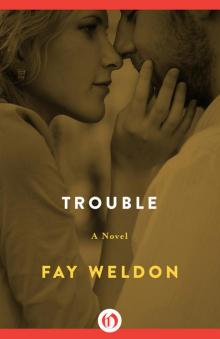 Trouble
Trouble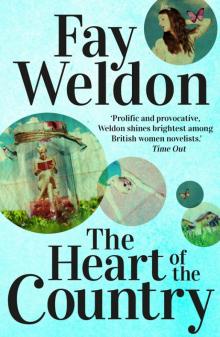 The Heart of the Country
The Heart of the Country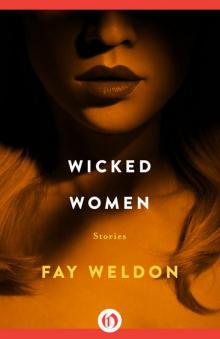 Wicked Women
Wicked Women Mischief
Mischief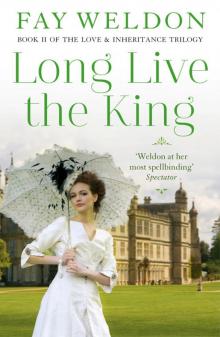 Long Live the King
Long Live the King Remember Me
Remember Me Worst Fears
Worst Fears Chalcot Crescent
Chalcot Crescent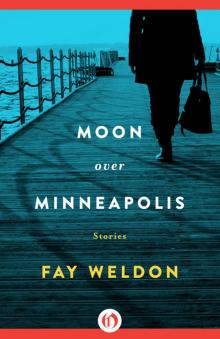 Moon Over Minneapolis
Moon Over Minneapolis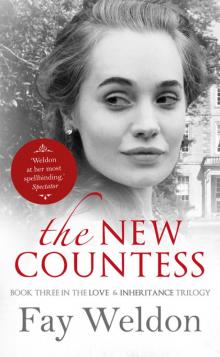 The New Countess
The New Countess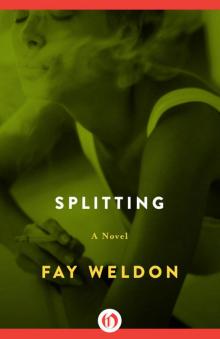 Splitting
Splitting After the Peace
After the Peace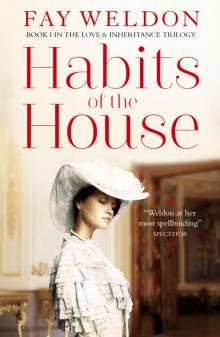 Habits of the House
Habits of the House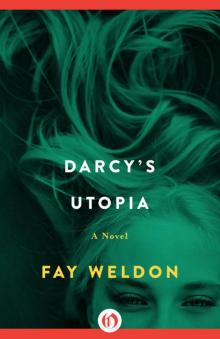 Darcy's Utopia
Darcy's Utopia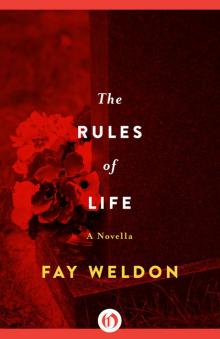 The Rules of Life
The Rules of Life Kehua!
Kehua! Before the War
Before the War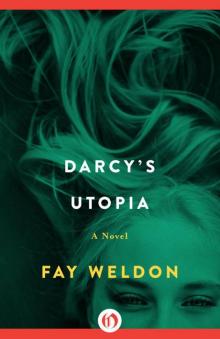 Darcy's Utopia: A Novel
Darcy's Utopia: A Novel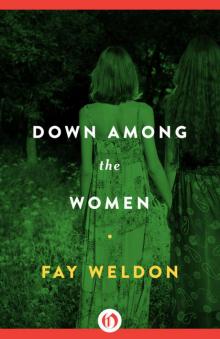 Down Among the Women
Down Among the Women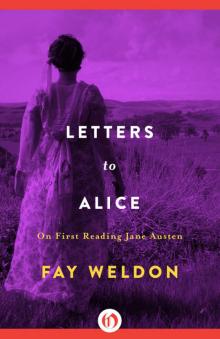 Letters to Alice
Letters to Alice 3 Great Historical Novels
3 Great Historical Novels Female Friends
Female Friends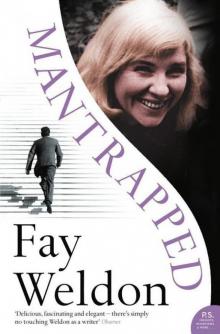 Mantrapped
Mantrapped The Bulgari Connection
The Bulgari Connection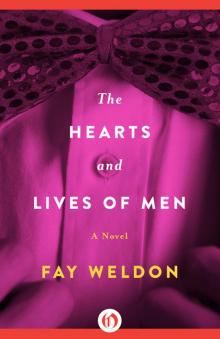 The Hearts and Lives of Men
The Hearts and Lives of Men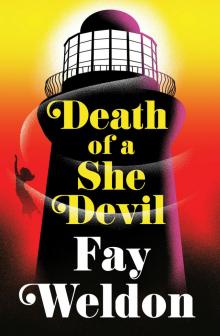 Death of a She Devil
Death of a She Devil